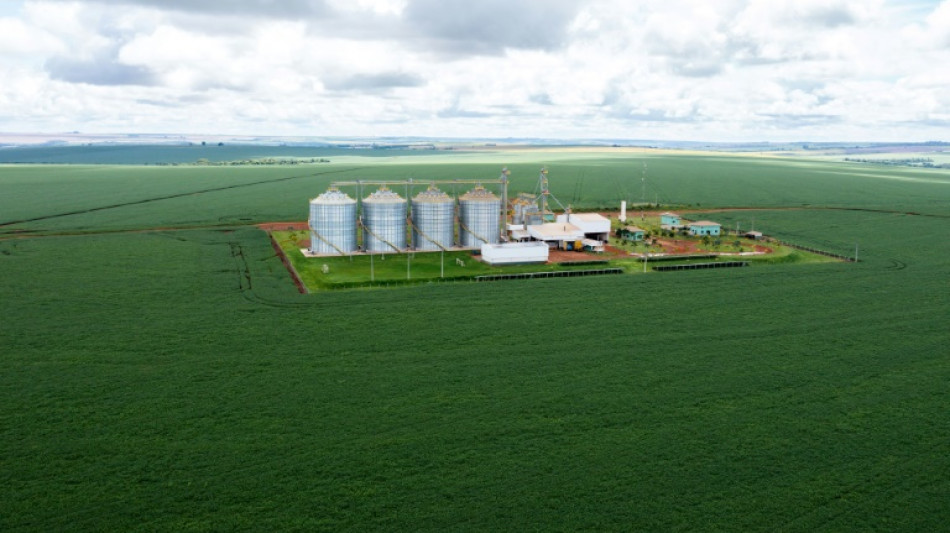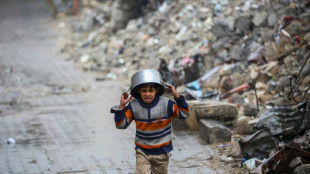
-
 No regrets: Merkel looks back at refugee crisis, Russia ties
No regrets: Merkel looks back at refugee crisis, Russia ties
-
IPL history-maker, 13, who 'came on Earth to play cricket'

-
 Ukraine says Russia using landmines to carry out 'genocidal activities'
Ukraine says Russia using landmines to carry out 'genocidal activities'
-
Prosecutors seek up to 12-year terms for French rape trial defendants

-
 'Record' drone barrage pummels Ukraine as missile tensions seethe
'Record' drone barrage pummels Ukraine as missile tensions seethe
-
Laos hostel staff detained after backpackers' deaths

-
 Hong Kong LGBTQ advocate wins posthumous legal victory
Hong Kong LGBTQ advocate wins posthumous legal victory
-
Ukraine says cannot meet landmine destruction pledge due to Russia invasion

-
 Rod Stewart to play Glastonbury legends slot
Rod Stewart to play Glastonbury legends slot
-
Winter rains pile misery on war-torn Gaza's displaced

-
 'Taiwan also has baseball': jubilant fans celebrate historic win
'Taiwan also has baseball': jubilant fans celebrate historic win
-
Russia pummels Ukraine with 'record' drone barrage

-
 Paul Pogba blackmail trial set to open in Paris
Paul Pogba blackmail trial set to open in Paris
-
China's Huawei unveils 'milestone' smartphone with homegrown OS

-
 Landmine victims gather to protest US decision to supply Ukraine
Landmine victims gather to protest US decision to supply Ukraine
-
Indian rival royal factions clash outside palace

-
 Equity markets retreat, dollar gains as Trump fires tariff warning
Equity markets retreat, dollar gains as Trump fires tariff warning
-
Manga adaptation 'Drops of God' nets International Emmy Award

-
 China's Huawei launches 'milestone' smartphone with homegrown OS
China's Huawei launches 'milestone' smartphone with homegrown OS
-
Philippine VP denies assassination plot against Marcos

-
 Four Pakistan security forces killed as ex-PM Khan supporters flood capital
Four Pakistan security forces killed as ex-PM Khan supporters flood capital
-
Hong Kong's legal battles over LGBTQ rights: key dates

-
 US lawmakers warn Hong Kong becoming financial crime hub
US lawmakers warn Hong Kong becoming financial crime hub
-
Compressed natural gas vehicles gain slow momentum in Nigeria

-
 As Arctic climate warms, even Santa runs short of snow
As Arctic climate warms, even Santa runs short of snow
-
Plastic pollution talks: the key sticking points

-
 Indonesia rejects Apple's $100 million investment offer
Indonesia rejects Apple's $100 million investment offer
-
Pakistan police fire tear gas, rubber bullets at ex-PM Khan supporters

-
 Ronaldo double takes Al Nassr to brink of AFC Champions League last 16
Ronaldo double takes Al Nassr to brink of AFC Champions League last 16
-
Pakistan police fire tear gas, rubber bullets at pro-Khan supporters

-
 Hong Kong same-sex couples win housing, inheritance rights
Hong Kong same-sex couples win housing, inheritance rights
-
Indonesia digs out as flooding, landslide death toll hits 20

-
 Liverpool's old guard thriving despite uncertain futures
Liverpool's old guard thriving despite uncertain futures
-
Mbappe takes reins for Real Madrid in Liverpool clash

-
 As AI gets real, slow and steady wins the race
As AI gets real, slow and steady wins the race
-
China's Huawei to launch 'milestone' smartphone with homegrown OS

-
 Porzingis and Morant make triumphant NBA returns
Porzingis and Morant make triumphant NBA returns
-
Hong Kong top court affirms housing, inheritance rights for same-sex couples

-
 Philippines, China clashes trigger money-making disinformation
Philippines, China clashes trigger money-making disinformation
-
Most Asian markets drop, dollar gains as Trump fires tariff warning

-
 England 'not quivering' ahead of New Zealand Test challenge
England 'not quivering' ahead of New Zealand Test challenge
-
Bethell to bat at three on England Test debut against New Zealand

-
 Trump vows big tariffs on Mexico, Canada and China
Trump vows big tariffs on Mexico, Canada and China
-
New Zealand and England to play for Crowe-Thorpe Trophy

-
 Scheffler, Schauffele and McIlroy up for PGA Player of the Year
Scheffler, Schauffele and McIlroy up for PGA Player of the Year
-
Trump to face less internal pushback in new term: ex-commerce chief

-
 Extreme weather threatens Canada's hydropower future
Extreme weather threatens Canada's hydropower future
-
More than 34,000 register as candidates for Mexico judges' election

-
 Australia ban cycling's Richardson for life after UK defection
Australia ban cycling's Richardson for life after UK defection
-
Internal displacement in Africa triples in 15 years: monitor


'Harvesting data': Latin American AI startups transform farming
For centuries, farmers used almanacs to try to understand and predict weather patterns.
Now, a new crop of Latin American startups is helping do that with artificial intelligence, promising a farming revolution in agricultural giants like Brazil, the world's biggest exporter of soybeans, corn and beef.
Aline Oliveira Pezente, a 39-year-old entrepreneur from the Brazilian state of Minas Gerais, was working at agriculture company Louis Dreyfus Commodities when she noticed a problem in how the farming industry operates in Brazil.
Producers need huge amounts of credit up-front to buy inputs like seed and fertilizer, she says. But lenders are wary given how difficult it is to size up the myriad risks, from the natural -- droughts, floods, crop disease, erosion -- to the financial -- bankruptcy, price crashes and more.
In 2018, Aline and her husband Fabricio launched a startup called Traive that collects massive amounts of agriculture-related data, then analyzes it with AI, breaking down the capital risk for lenders and giving farmers easier access to credit.
"Lenders used to each use their own (risk analysis) model. Imagine like a giant Excel file," Aline told AFP. "But it's very hard for humans, even those who are super knowledgeable of statistics and mathematics, to create equations that capture the nuances of all the variables.
"They were taking three months to do something that we can do in five minutes with way better accuracy," said Aline, who has a master's degree specializing in AI and data analysis from Massachusetts Institute of Technology.
- AI for agriculture -
Seven years on, Traive's clients include agro-industry giants like Syngenta, fintech firms and Latin America's second-biggest bank, Banco do Brasil. More than 70,000 producers use its platform, which has facilitated nearly $1 billion in financial operations, it says.
Aline presented her work this week at the Rio de Janeiro edition of Web Summit, the massive tech gathering dubbed "Davos for Geeks."
Speaking alongside her on a panel called "Harvesting Data: The Next Agricultural Revolution," fellow entrepreneur Alejandro Mieses explained how AI has the potential to reshape farming.
Worldwide, farmers are increasingly turning to AI to boost yields and returns, with applications like self-driving tractors, drones that track crop health and smart cameras that recognize weeds for herbicide treatment.
Mieses's Puerto Rico-based startup, TerraFirma, developed an AI model that uses satellite images to forecast environmental risks like natural disasters, crop disease and erosion.
"We insist on the physics of it, because we believe that is the base point. Understanding how water moves, how wind moves, how different solar exposures operate throughout your farmland," he said at Web Summit, of which AFP is a media partner this year.
The hard part, the panelists said: AI models have to be trained on massive amounts of data.
Although farmers tend to be data-obsessed -- painstakingly tracking environmental conditions, inputs and productivity -- gathering and processing that information around the world is complex.
"It's quite resource-intensive. You need servers, you need an immense repository of data," said Mieses, 39.
"It's the same old story of garbage in, garbage out."
- Climate question -
The agriculture industry faces criticism in countries like Brazil, whose rise as an agricultural powerhouse has also seen a surge of environmental destruction in key regions like the Amazon rainforest, a vital resource against climate change.
Innovation optimists argue that, with the world's population expected to reach nearly 10 billion people by 2050, technologies like AI are humanity's best hope for surviving without destroying the planet.
Mariana Vasconcelos is the 32-year-old chief executive of Brazilian startup Agrosmart, which uses AI to help farmers manage climate risks and produce more sustainably.
"The UN Food and Agriculture Organization says we need to increase food production to feed a growing population. At the same time, we have to produce with less: less land, less deforestation, less carbon footprint. How can we do that without technology?" she said.
"Agriculture is often seen as opposed to nature. But I think technology is showing that actually it can regenerate, restore the environment, work together with nature... Agriculture is headed for a more sustainable model."
J.Horn--BTB




